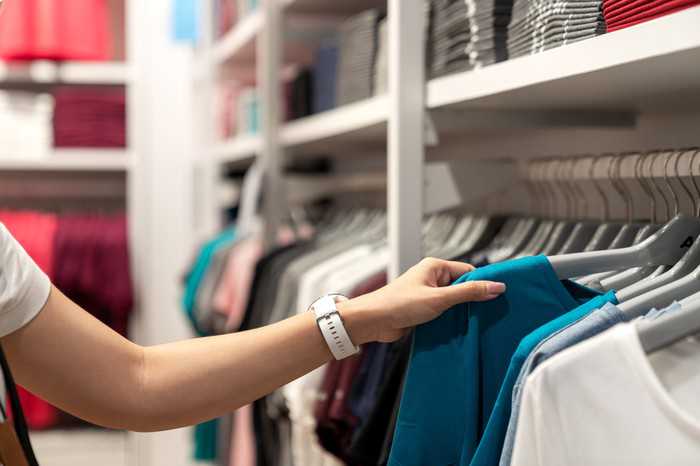Here's Another Opportunity Department Stores Can't Capitalize On

Image: Collected
The retailing industry may finally be crawling out of its COVID-prompted slump. It's only rebounding, even so, back into a pre-pandemic headwind that's still picking off a large number of stores per year. In fact, the headwind could even be gaining quickness in light of the most recent apparel trend: individualized clothing. Deloitte estimates custom-made apparel could take into account just as much as 30% of the clothing marketplace by 2030. The proliferation of new fabric printing and manufacturing technologies has recently ushered some brands in to the business, but we're still simply in the early stages of the movement.
The bad news: Even the virtually all iconic brick-and-mortar store chains like Macy's (NYSE: M) and Nordstrom (NYSE: JWN) aren't well-suited for this shift, increasing their existing plight.
Cut from a different cloth
It is possible you're already participating in this paradigm change. Denim brand Levi's (NYSE: LEVI), for instance, allows online buyers to select laser-etched patterns, custom-made color, and embroidered text for garments ordered on the web. Athletic apparel manufacturer Nike (NYSE: NKE) lets consumers custom style their sneakers from the bottom up, picking their unique color combinations, sole forms, and style. Amazon launched DESIGNED FOR You in December, presenting consumers a means of designing a custom-cut and custom-shaded T-shirt. Actually funky foam clog firm Crocs (NASDAQ: CROX) gets in on the action, letting its e-commerce clients choose the pins they would like to adorn their footwear.
None of these are earth-shattering advances for the apparel business, but these customization options are actually plugging into a powerful craze that's only likely to become more powerful as time marches on. Deloitte's outlook on the customized clothing trend explains:
Deloitte especially credits technological advancements while the chief driver of the trend. The features to offer customized outfits to the mass marketplace simply haven't existed as yet.
Stores aren't suited for the shift
To their credit, department stores are upping their game titles in terms of providing more customized service too.
Take these Macy's for example. Most stores offer tailoring services, and buyers can delegate the work of picking new clothes to personal stylists. The business is also making a point of moving some stores from the mall closer to residentially abundant areas and outfitting locations with new engagement technology.
Nordstrom is doing even more with the idea of meeting buyers where they are in the way they want to be met. Its "Nordstrom Native" initiative demands small service stations nearer to people's homes, offering buy pickup, alterations, and extra without forcing a shopper to visit a mall. A clothing-customization service will be a natural expansion of the existing presence. Deloitte even says retailers will dsicover opportunity in the customization trend as it allows stores to get fewer goods that end up getting reduced to have them out the door.
Seeing a chance and having the capacity to act on it, however, are two different things.
The biggest hurdle shops may face upon this front is cost. Textile laser etchers and professional 3D printers can expense thousands, if not thousands of dollars, apiece, for example, and operating them necessitates training. It is also another function currently strained brick-and-mortar retailers would need to perform, requiring extra employees and extra square footage that could be used in other ways. A store chain could certainly centralize the creation of the garments at a remote facility, but Levi's and Amazon curently have.
Even beyond the price, however, department stores even now face the long-standing challenge of maintaining their relevancy. As large as e-commerce is becoming, Digital Commerce 360 estimates significantly less than 40% of 2019's clothes spending was done online. Apparel general market trends outfit Prevalent Thread Collective assignments that proportion reaching 60% worldwide by 2024. In complete terms, how big is the web fashion market is expected to reach $953 billion by 2024, doubling 2018's tally of $439 billion.
Conventional shops remain too distracted by a bigger war with e-commerce opponents to devote meaningful resources to the custom-made clothing movement.
Sewing everything together
The takeaway for investors isn't obvious. While custom-made apparel is a good brand-builder for players like Amazon and Nike, the budding marketplace isn't likely to move the fiscal needle many for either company. Also, department stores aren't likely to leverage customized attire into a turnaround tool.
Nevertheless, it's a expansion investors should remember. On the off prospect a brick-and-mortar name like Nordstrom can plug into the tendency and meld it with existing providers, it could indeed be considered a growth engine. The much more likely chance for investors, however, is going to be provided by a direct-to-consumer company getting into the business, and even companies that supply the equipment needed to manufacture custom-made apparel.
10 shares we like much better than Nordstrom
When trading geniuses David and Tom Gardner have a inventory tip, it could pay to listen. After all, the newsletter they have run for over a decade, Motley Fool Stock Advisor, provides tripled the marketplace.*
David and Tom just revealed what they believe will be the ten best stocks for investors to get at this time... and Nordstrom wasn't one of these! That is right -- they think these 10 stocks are even better buys.
Source: https://www.nasdaq.com
Previous Story
- Restructuring export basket on lines of Bangladesh need...
- Rising Bangladesh exports keep lessons for India: Eco...
- Circular Manner: H&M Launches Children Collection Made From...
- Sustainable Biotech Genomatica To Scale 100% Renewable Bio-Nylon...
- Duvaltex & Steelcase start panel textile from marine...
- The journey of fabric from anti-bacterial to anti-viral
- Kala Cotton: Weaving modern designs with some tradition
- Cone Denim collaborates with Oritain for cotton traceability